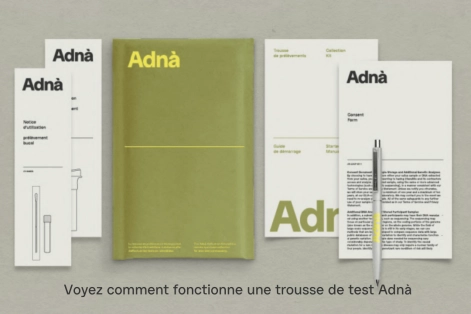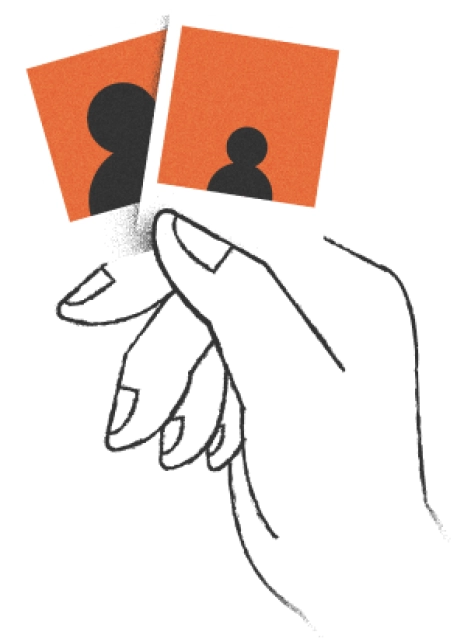Testimonials
I was very satisfied with the service I received from ADNÀ and I highly recommend this company.
“Very professional and really interesting. Thank you!!!”
Additional information
Identical twins originate from a single fertilized egg, called a zygote. The zygote, which usually develops into a single child, divides early in development to form two embryos, creating twins with the same DNA. In contrast, dizygotic twins develop when two different eggs in the mother's uterus are fertilized by two different sperm cells. Dizygotic twins will not have exactly the same DNA.
The twinship test we offer can determine whether two twins are identical twins or not. The test protocol is very rigorous and precise. It includes the reading of 22 DNA sequences (22 loci), giving the test an absolute percentage of certainty.
Process
- After ordering your test, you will receive a collection kit that includes 2 swabs. You'll find the collection instructions in the envelope. This is a painless process.
- Register your kit and personal information in your customer portal on the Adnà website.
- Return your sample (in its original envelope) to the laboratory for sequencing and analysis.
- You will receive an e-mail notification that your test report has arrived in your Adnà customer portal.
- Results are normally ready in five business days after reception of your samples at the laboratory.

Same-Day Delivery
Shipped the same day you order.
French, English and Spanish customer support available.

SCC Accredited - Accrédité par le CCN
Our partner laboratory is accredited by the Standards Council of Canada

Proudly Quebecois
DNA tests designed and processed in Canada. Order online from across Quebec and Canada.

ISO 17025 Certification
ISO17025 Accredited Partner Laboratory
Questions?
What is the difference between a twin test and a sibling test?
A twin test determines whether twins are monozygotic (identical) or dizygotic (fraternal) by comparing their DNA.
A sibling test, on the other hand, evaluates the biological relationship between two individuals to determine if they are brothers or sisters by analyzing the proportion of shared DNA.
What is the intended use of the information you collect?
We collect your personal information for the following purposes:
- To create, use and manage your user accounts on our platform;
- To provide you with the products and services you request;
- To better understand the use of the platform;
- To analyze and improve your user experience;
- To communicate with you;
- To develop, improve, market or provide the platform and our products and services;
- To back up our databases and keep your records;
- To establish, exercise or defend legal claims, whether in judicial, administrative or extrajudicial proceedings for the protection and vindication of our legal rights, your legal rights and the legal rights of others;
- To comply with applicable laws and regulations.
Who is my personal information shared with?
Your information is shared with the following partners:
- Payment service providers;
- IT service providers;
- Genetic analysis laboratory partners;
- Digital analysis and statistics service providers;
- Partners, government agencies and regulatory authorities, judicial bodies, associates, agents, attorneys or other representatives for compliance with legal obligations to which we are subject;
- To any other person as permitted and/or required by law.
How do you ensure the privacy and security of my genetic data?
- We use cutting-edge encryption to protect your data;
- We strictly respect privacy laws;
- We ensure that our partners comply with these laws;
- We ensure that your genetic information is anonymized when transmitted to our partner laboratories.
Will my genetic data be shared or sold to third parties?
- Your data will never be shared with or sold to third parties.
Our privacy policy describes in detail your rights, the measures we take to protect your data, and how your data is used.
What types of genetic tests do you offer?
Our tests fall into several categories:
- Filiation tests, which identify whether there is a familial relationship between two or more individuals.
- Well-being tests, which provide information on how your genes can influence your lifestyle, preferences, health, and well-being.
- Health tests, which help identify genetic predispositions to certain diseases or how the body metabolizes specific medications.
- Ancestry tests, which offer insights into an individual’s family origins and genetic lineage across different historical periods.
- Microbiome tests, which identify and quantify the various bacteria and microorganisms present in a person’s microbiome.
- Biomarker tests, which measure specific substances in the blood to assess an individual’s health, detect diseases, or monitor their progression.
What are the limits of your tests?
- Our tests are for informational and educational purposes. They are not intended to be used as a diagnostic tool. Your traits are not only influenced by genetics, but also by many other factors such as social and geographical environment, education, lifestyle, etc. We encourage you to interpret the results with caution, and to consult healthcare professionals for further evaluation if necessary.
The information extracted from the tests and presented in our reports should be considered as indications of predisposition and not as definitive diagnoses. Their relevance may vary according to numerous environmental factors.
What is the scientific basis for your tests?
- A parentage test uses DNA to establish family relationships. It analyzes genetic markers to identify biological relationships between parents and children, grandparents, uncles, aunts, twins and siblings. DNA comparison reveals specific genetic similarities, indicating a family relationship. These tests exploit genetic patterns of inheritance shared by members of the same family. In this way, they can map out extended family connections, offering a precise overview of biological links. Our parentage tests offer close to 99.9% accuracy.
- Our lifestyle and health tests are based on a combination of cutting-edge technologies and internationally recognized scientific studies. DNA sequencing is performed using Illumina technology. This technology can analyze over 700,000 genetic markers. Added to this is the integration of peer-reviewed studies accepted by the international scientific community, which enable a connection to be made between a particular gene and a potential predisposition. This ensures that reports are based on recent, relevant scientific data that reflect an established scientific consensus.
What information can I find in your genetic reports?
- Depending on the type of test you choose, you can expect to receive detailed information about your parentage, your ancestry, personalized health advice, or insight into specific genetic traits.
Can your tests identify predispositions to certain diseases?
- Yes, our Genetic Predisposition Test answers this question. However, this test is not intended for diagnostic purposes.
Yes, for relationship tests, our partner laboratory can perform the analysis on non-standard samples such as a toothbrush or blood, for example. The cost is higher, ranging from $750 to $850, and the turnaround time is longer because the laboratory first applies a DNA extraction method tailored to the type of material. Some samples (e.g., hair without roots, old tissues, cigarette butts that are too old) contain very little or degraded DNA.
Here is the exhaustive list of possible sample types and their acceptability criteria:
🔹 Success Rate: 90% or Higher
- Whole Semen: Frozen vial, fresh swab, or semen on fabric.
- Whole Saliva: Tube with preservative preferred.
- Whole Blood: Stored in lavender-topped vacutainer tube.
- Blood/Saliva on Filter Paper: On paper/matrix, less than 60 days old.
- Bone Marrow: Fresh/frozen (not slides/paraffin).
- Mucus/Sputum: Tissue, napkin, or paper towel.
- Toothbrush: Air dry 30 minutes before packaging.
🔹 Success Rate: 60% to 90%
- Blood Stain on Fabric: Bandages, gauze, tissue, napkin, clothing.
- Semen Stain on Fabric: Gauze, tissue, clothing (indicate stain area).
- Saliva Stain on Fabric: Gauze, tissue, clothing (indicate stain area).
- Unknown Stain on Fabric: Biological stain of unknown origin.
- Fingernail/Nail Clippings: 5–10 clippings recommended.
- Diabetic Test Strips: Multiple strips.
- Ear Swab: Cotton swab/Q-tip.
- Umbilical Cord: Preferably dried; reference sample from mother.
- Cigarette Butts: Multiple preferred.
- Tampon/Feminine Pad: May not provide viable DNA.
- Drinking Straw: Air dry before packaging.
- Dental Floss: Do not touch floss with fingers.
- Semen (volume): ≥200μl, send frozen.
- Muscle/Organ Tissue: Non-embalmed specimens preferred.
- Fetal Demise: Reference sample from mother required.
🔹 Success Rate: 60% or Less
- Hair: Roots visible; 7–10 strands.
- Razor (disposable): Entire blade with debris.
- Comb/Brush: Entire item with debris.
- Chewing Tobacco: Sealed plastic bag; less than 3 days old.
- Jewelry: Ring, watch, necklace, etc.
- Chewing Gum: Sugarless preferred.
- Soda Can/Drinking Glass: Whole item preferable to swabbing.
- Clothing: Hats, ball caps, bandanas.
- Envelope Flaps/Stamps: Must have been licked.
- Condom: Send whole condom (inside & outside tested).
- Paraffin Embedded Tissue: Paraffin block or slides.
🔹 Success Rate: N/A
- Teeth: Molars preferred.
- Bone: Femur, humerus, or metacarpal (thumb bone).
- Feces: Sealed plastic bag, shipped cold/dry ice.



